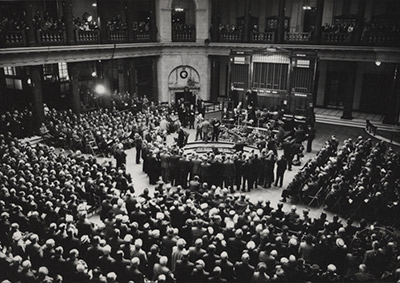The Raw Cotton Commission becomes the sole importer and distributor of cotton in the UK
January 1948
The Liverpool and Manchester Cotton Associations did their best to dissuade the government from its course of action. On 2nd November 1945, they produced a memorandum addressed to the Board of trade, entitled The Import of Raw Cotton into the United Kingdom. The paper included a memorandum submitted by the Federation of Master Cotton Spinners’ Associations Ltd, and a string of telegraph cables from representatives of cotton-growing countries and marketing centres from around the world all supporting the notion of a return to the situation that had prevailed before the war. Its recipient, Sir Stafford Cripps, described the memorandum as having presented "a very good case deserving of the most careful consideration".
In essence, the pamphlet made a case for a system of free enterprise to a government whose outlook favoured state control. The result was probably inevitable. On 28th March 1946, the motion "That this House regrets the decision of His Majesty’s Government not to reopen the Liverpool Cotton Market and considers that the system of bulk purchase under state control will hamper the manufacturer, increase the cost of cotton to the consumer and deprive this country of a valuable source of foreign exchange" was defeated by 337 votes to 186.
The Liverpool Cotton Association continued to press its case. Responding to a speech made on 3 May 1946 by David Marquand, the Parliamentary Secretary to the Board of Trade, the Association produced another pamphlet, this time with the more provocative title A Warning to the Taxpayer: the destruction of a national asset. Whereas the first pamphlet had been measured and rational, the desperation of the situation led to language that was somewhat more direct. The opening paragraph spelled out the position clearly:
"The importation of raw cotton is a highly scientific business and it is therefore not altogether surprising that the uninitiated should hail Mr Marquand’s speech at Blackpool on the 3rd of May as a conclusive argument that the Government’s proposed new system can successfully replace the service rendered by the Liverpool and Manchester merchants, backed by the intricate and efficient machinery of the Liverpool market. In order to refute these ill-informed statements and prejudiced opinions, a replay is made seriatim to each point of Mr Marquand’s speech which is reproduced below."
The pamphlet reproduced extracts from sections of the American press, including an article entitled The Twilight of the Free Market by the New York Times, which wrote that
"The Liverpool Cotton Market before the last war was the centre of the greatest single international market. Every drought or rain, every local rise or fall of demand, every item in the composite information of thousands of cotton specialists all over the world, registered itself hourly on the delicate seismograph known as the Liverpool Cotton Market. This wonderful mechanism is now to be thrown aside permanently so that some government official can substitute his own judgment of what British buyers should pay for cotton."
This echoed the provocative question asked elsewhere in the pamphlet: "Did the Electors give to the Government a mandate to damage our national and international interests to this extent and to compel the Taxpayer to undertake all the hazards of a risk-bearing business for the sake of trying out an ill-informed political theory?"
In June 1946, Walter Brownwell, now President of the Liverpool Cotton Association, wrote directly to the Prime Minister, Clement Atlee to present his case. In addition to arguing on economic grounds, he also appealed to Atlee to consider the effect the decision to set up the Raw Cotton Commission would have on the employment prospects for the members of the cotton trade. He pointed out that
"In your recent speech to the Labour Party Conference at Bournemouth, you mentioned ‘Justice for All’ as one of your party’s principles. I ask you to live up to it." In his reply, Atlee acknowledged "that centralised purchase and the disappearance of the futures market will mean a reduction of the numbers employed in the cotton market. I regret that any cases of hardship should arise, but…the government feel that their decision is one which should be made in the broader interests of the cotton market and the nation."






